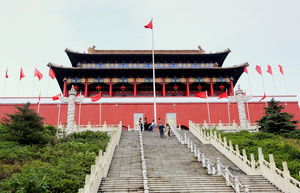|
|||||||||||
HOHHOT- This autumn's record-setting potato harvest is no longer something to celebrate for farmers in North China's Inner Mongolia Autonomous region.
"Without considering the ripe potatoes still in the field, I have thought of hanging myself to forget the potatoes everywhere," said Zhao Hongbao, who had planted more than 700 mu (46 hectares) of potatoes in Xilingol League.
Despite a record-high potato harvest, many farmers in Inner Mongolia, like Zhao, have had to suspend their harvesting, keeping ripe potatoes in the fields or storing ones that have already been collected in cellars.
Due to recent low purchase prices, they are waiting to sell them when prices rise to a proper level.
"If I sold all the potatoes at the current prices, I could not even make ends meet," said Zhao.
Inner Mongolia is China's largest potato production area as well as its largest volume production area. The purchase price of potatoes is critical to local farmers who rely mostly on potato crops.
Potatoes are one of the major crops planted in China's northwestern, northeastern, northern and southwestern areas, which cover fifteen provinces and regions and includes 60 million farmers
Meanwhile, data shows that potato prices have dropped by 30 percent to 50 percent year on year.
Di Shangying, a farmer in the city of Ulanqab, said the money he earned from selling potatoes would barely offset production costs, including fees for fertilizer, electricity and diesel and not including human labor.
"With so little money earned, I just worked so hard for nothing the whole year," said Di.
Given the stable market demand, the glut of potatoes could be a reason for the decline in purchasing prices, said Zhou Qingfeng, head of the Potato Starch Specialty Council of the China Starch Industry Association.
"The total potato production volume is estimated to exceed 70 million tonnes, compared to less than 50 million in 2010. That's an increase of 5 million tonnes in Inner Mongolia alone," Zhou added.
Speculation could be another factor affecting potato prices, said Kang Rui, the head of a local agricultural cooperative in Hohhot, Inner Mongolia's capital city.
Many people turned to potato farming this year and intended to make huge profits as potatoes were sold at very reasonable prices last year. However, this short-sighted activity disrupted the balance in the supply and demand in this year's potato market, causing price drops as well as losses for local farmers and themselves, Kang said.
The small-scale peasant economy is very vulnerable in the market economy, so the government should promote integrating it into the cooperative-based agriculture industry where farmers are more competitive and unified, Ye Tan, one of China's most popular financial and economic columnists, wrote on her blog.
According to Kang's analysis, a fundamental solution is to develop a deep-processing industry for agricultural products at the local level.
"Introducing deep-processing plants would not only reduce transportation costs for potatoes, but also help open up a larger market for our products," said Shen Jianguo, a farmer from Xilingol League.
Some farmers are calling on the government to provide more information about agricultural products and offer guidance in their planting plans, which could both contribute to reducing the risk of blind planting.
"We are perplexed every year in deciding what to plant. You never know whether you are going to make or lose money after the harvest," said Qi Xiaohua, a farmer in Hohhot.
- China adamantly opposes US yuan bill
- China, Russia near deal on gas
- China, Vietnam focus on future ties
- Red Cross changes leadership
- US Senate passes yuan bill amid China's opposition
- China, Vietnam sign maritime accord
- Chinese, Russian PMs pledge closer co-op
- Russia, China working on new energy routes
Hot Topics
Libya conflict, Gaddafi, Oil spill, Palace Museum scandal, Inflation, Japan's new PM, Trapped miners, Mooncake tax, Weekly photos, Hurricane Irene
Editor's Picks

|

|

|

|

|

|







